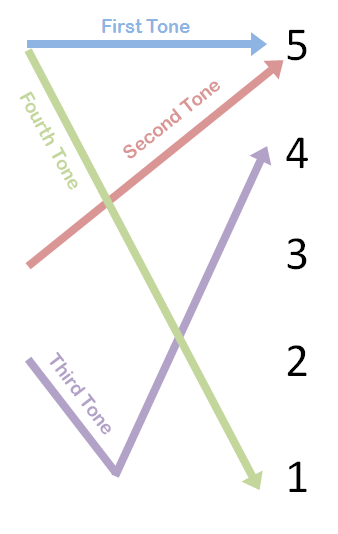| Login | Register |
Mandarin is a tone dependent language. This means that you can say the same word with a different tone, and it will have a completely different meaning. For example, to buy is "mǎi", but to sell is "mài." A shop keeper in China may not know whether you are planning to buy or to sell unless you are accurate with your tones.
To help foreigners learn Mandarin, the Pinyin system was developed. The following shows the basic of the Pinyin system with the 4 tones used in Mandarin (the 5th tone being neutral):
 |
|
Each Mandarin syllable consists of an initial and final. Below are the tables for initials and finals:
| Initials | |||||||
|---|---|---|---|---|---|---|---|
| b | p | m | f | d | t | n | l |
| g | k | h | j | q | x | ||
| zh | ch | sh | r | z | c | s | |
| (y) | (w) | ||||||
| Finals (English pronounciation in brackets) |
||||||||||
|---|---|---|---|---|---|---|---|---|---|---|
| Single Vowels | a (aah) |
o (awe) |
e (ergh) |
i (ea) |
u (oo) |
ü | ||||
| Double Vowels | ai | ei | ao | ou | ia (ya) |
ie (ye) |
iao (yow) |
iu (you) |
||
| ua (wa) |
uo (wo) |
uai (wai) |
ui (wei) |
üe (yue) |
er (are) |
|||||
| Nasal Vowels | an | en | in (yin) |
un (wen) |
ün (yun) |
üan (yuan) |
ang | eng | ||
| ing (ying) |
ong | iang (yang) |
ueng (weng) |
iong (yong) |
uang (wang) |
uan (wan) |
ian (yan) |
|||
English speakers tend to have trouble with specific initials and finals. If you are an English speaker, please pay special attention to the following initials and finals:
| Hard to pronounce Initials and Finals | |||||||||
|---|---|---|---|---|---|---|---|---|---|
| ü | Start pronouncing "ee" in English and then round your lips to pronounce "oo". Also, if ü follows the letter j, q, x, or y, it is simply written as "u" | ||||||||
| q | Pronounced like "ch" in chin | ||||||||
| x | Pronounced like a cross between "she" and "he". There is no exact English equivalent. | ||||||||
| z | Pronounced like "ds" in kids | ||||||||
| c | Pronounced like "ts" in bats | ||||||||
| zh | Pronounced like "ger" in germ | ||||||||
| ch | Pronounced like "chur" in church | ||||||||
| sh | Pronounced like "sur" in sure | ||||||||
| er | Pronounced like "ar" in are | ||||||||
| i | When i follows z, c, s, it sound more like "zz": zzz, czz, szz When i follows zh, ch, sh, r, it sounds more like "rr": zhrr, chrr, shrr, rrr. |
||||||||